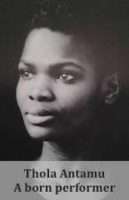FunDza interviewed 10 Fantastic FunDza Fanz! Meet Njabulo…
Njabulo Goba writes crime stories that are inspired by real-life events around him in Georgedale. Using the pen, Njabulo is able to express the impact of criminality on the world around him – and he now sees a future in literature.
A childhood in “the capital of crime”
“Growing up, my life was basically my mother trying to protect us from this place,” explains Njabulo, 27. He was raised and lives in an area near eThekwini in KwaZulu-Natal. “It’s just gangster. We joke and say that it’s the capital of crime that nobody knows about.”
As a single mother of seven children with a full-time job, Njabulo’s mother had little time to be at home. Concerned at the crime in the area, she developed a method to shield her children from the dangers of outside. Njabulo’s mother struck a deal with her children – she would buy them video games (and later a computer) if they promised that, other than going to school, they would spend their time at home. “That might seem like a small thing, but it was very big,” reflects Njabulo. “I know how expensive it was for her.” Njabulo considers himself “one of the lucky ones” – and he credits his mother for the fact that he survived until today.
Getting into rap music at the age of twelve, Njabulo began writing his own lyrics. “The beats were a distraction from the words,” he explains – and his lyrics soon evolved into other forms of poetry. Eventually, poetry began to feel restrictive and Njabulo began writing stories.
Struggles with mental health
Although Njabulo is grateful to his mother for keeping her children safe, he also acknowledges that being homebound contributed to his struggle with depression. Unable to maintain friendships because he had to go home straight after school led to isolation. “I cannot explain how … a kid so young has such a depressing view of the world. I couldn’t talk to anybody about how I felt,” he reflects.
Another attributing factor was being so aware of the crime going on around him outside the house and on two occasions inside his own home too. The video games and computers that were to “protect” them from the outside were stolen while they were sleeping. When he was thirteen, Njabulo witnessed a man being stabbed to death on the pavement outside. Understandably, these events deeply impacted Njabulo, and writing helped him through these times.
A real life crime novel
Stories and events that Njabulo has been traumatised by are now woven into his writing. “With writing, I am able to take those things and put them into stories. This makes me feel like I am gaining some sort of control over the situation.” Njabulo explains that he gets his “revenge” through writing.
Njabulo’s crime stories come straight from his neighbourhood. “You listen to stories at school, you hear gunshots at night,” he says. Njabulo appears as minor characters in his stories. He casts himself as a bystander – much like himself growing up, watching the world from the window of his house.
Choosing a different path
Njabulo explains that he comes from a community where writing and the arts are not strongly encouraged and are certainly not seen as career paths. “There is a culture that you finish school and get a job. That’s it. Anything else is risky,” he says. Njabulo wants to change this perspective. “Everyone is doing the same thing, but expecting different results. I’ve always felt that I had to figure out how to do something different. Whether I make it or I don’t, it doesn’t matter – as long as I am able to say I tried to do things differently.”
Through FunDza’s mentorship programme, Njabulo feels like he has the freedom to express himself and to be creative. Four years ago, Njabulo tried something new – he submitted his story to a FunDza writing competition – and he won! “I’m way more comfortable and confident compared to the person I was,” he says as he reflects on the role of writing in his life. “I’m confident in wanting writing to be my career or something I do forever…I’m about to bring township stories to the world like it has never been done before.” Njabulo says that everything he has written to this day is just a teaser of what is to come. “I’m about to put us on the map!”
We asked Njabulo:
Why do you like writing for FunDza?
Because FunDza is awesome.
What is your favourite time of the day to write for FunDza?
Midnight.
What is one of your favourite stories that you’ve written for FunDza and why?
My favourite thing I’ve written is a short story called A Zulu Man”s Lightning. I feel like it’s a story that nobody else has written. It is unique to me and my own experience – that’s the beauty of it.
What do you enjoy doing in your spare time besides writing?
I enjoy watching interviews of famous people.
To read about the nine other Fanastic FunDza Fanz, click here.
***







